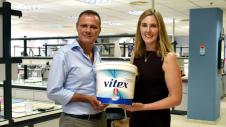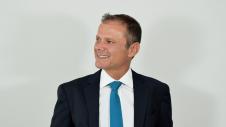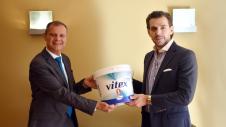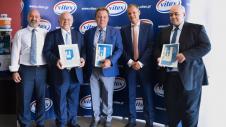The shock in the global supply chain and difficult conditions created in global industry due to the pandemic did not stop the rise of Greek company Vitex, which recorded an increase in sales in 2020, and strengthened its human resources, focusing on excellence in every service and product it offers.
Armodios Yannidis, vice president and CEO of Vitex, points out to Business Daily that although last year tourism suffered heavily as hotels remained closed, the shift to "Do it yourself" and the opportunities for renovations provided by the pandemic were a strong counterweight to continue growth for Vitex which in the last 8 years has seen its sales almost double.
At the same time, the push for excellence in every part of the chain is a key value for Vitex which, having left its important mark in the Greek market, aims to become the national brand in the field of paints.
- What were the effects of the pandemic and how did the turmoil in the international trade affect the industry?
In 2020 and the first months of 2021 the pandemic is undoubtedly affecting everyone, causing a big blow to many, however, there were sectors that were partially favored. Of course, tourism and catering are big losers.
In the paint industry, although the tourism product was lost with the hotels, which constitute a significant volume of sales, remaining closed, household consumption worked as a compensating factor. Lockdowns boosted home consumption as the Do-It-Yourself trend intensified and many wanted to renovate and repair their homes and public spaces. At the same time, many companies that were forced to close in the lockdown found the opportunity to either move or renovate during this time. Globally, the demand for building paints is estimated to have increased significantly.
However, the conditions were difficult for our industry and will be even more difficult in 2021. Restrictive measures and fears of reduced consumption led the chemical industry to slow down and operate at 78 percent of its capacity.
- How did you deal with the supply chain problems caused by the pandemic?
The supply chain has been one of the biggest challenges, as a number of constraints, were imposed and changes in manufacturing had to be addressed. In the industrial sector it is not easy to predict shortages. Even the lack of a single material that contributes little to the composition process can cause problems in the production of many products in which it is used. It is a chain reaction that causes multiple shocks and these conditions were an unprecedented experience for the global industry.
At one point, the only material that was not lacking was water. This leads to arrhythmias. Shortages in basic raw materials resulted in the prices of some quadrupling compared to last December and remain high or even increased further. Analysts estimate that this situation will not improve before the end of 2021.
We found that there would be problems due to restrictions and reduced production, and we decided to increase by 14 percent the already high stock we have, as it is Vitex culture to have enough stocks to meet seasonal or unforeseen market needs. We closed the year with having much more stock and hiring more staff as we aim to cover any gaps the moment they area created.
- Having a presence in foreign countries, what were the challenges for the company to operate?
In each of the foreign countries in which the company operates, different restrictive measures were imposed, whenever there could not be a common line that everyone could follow.
Apart from the precautionary measures that were the same everywhere, and we encouraged them, our main concern was that there should be no shortages in the supply chain of companies abroad. When there was a risk of a possible shortage due to tightening controls or other restrictive measures, stocks were strengthened as a precaution, while other measures helped our partners maintain their cash flow so that there is still movement in the market.
- Has there been a significant impact on your profitability from the restrictive and protective measures?
All the additional costs incurred had a significant impact on profitability, but nothing is significant in view of our health, the safe operation of our business and ensuring the effective service for customers.
As a company in recent years we applied a specific philosophy that the benefits and part of profitability should be distributed to all. The consumer must get a good product without being over-charged, the trader must make a satisfactory profit, and, we as a company, take a reasonable profit.
- How was 2020 for the company?
We closed the year with an increase in sales of 8 percent, while for 2021 things are looking positive, although there is a delay in orders compared to previous years. We also made the decision to increase our staff in the midst of a pandemic by 31 percent and now we employ 360 people.
Liquidity incentives were given to our partners, for timely payments with the program having a great response, while there was an effort to strengthen each partner with tools that will help him develop their business. We also took advantage of technology to stay in touch with partners, many training sessions were done on line and even today digital technical seminars are held every week.
The VitexTherm exterior thermal system also proved to be an extremely successful product as it is a system that is up to the standard of those abroad but has been adapted to Greek requirements and pricing.
Its demand is so big in Greece and Cyprus that the company is proceeding to create a new unit, production and storage of ready-made coatings. An investment of 4 million euros included in the new three-year investment plan of the company that will reach 10 million euros and aims to develop infrastructure in production and distribution.
STEFANOS TSOULAKIS









